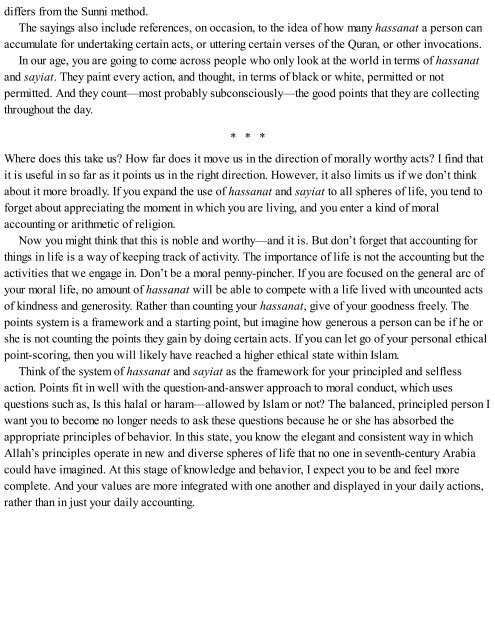1250119847
You also want an ePaper? Increase the reach of your titles
YUMPU automatically turns print PDFs into web optimized ePapers that Google loves.
differs from the Sunni method.<br />
The sayings also include references, on occasion, to the idea of how many hassanat a person can<br />
accumulate for undertaking certain acts, or uttering certain verses of the Quran, or other invocations.<br />
In our age, you are going to come across people who only look at the world in terms of hassanat<br />
and sayiat. They paint every action, and thought, in terms of black or white, permitted or not<br />
permitted. And they count—most probably subconsciously—the good points that they are collecting<br />
throughout the day.<br />
* * *<br />
Where does this take us? How far does it move us in the direction of morally worthy acts? I find that<br />
it is useful in so far as it points us in the right direction. However, it also limits us if we don’t think<br />
about it more broadly. If you expand the use of hassanat and sayiat to all spheres of life, you tend to<br />
forget about appreciating the moment in which you are living, and you enter a kind of moral<br />
accounting or arithmetic of religion.<br />
Now you might think that this is noble and worthy—and it is. But don’t forget that accounting for<br />
things in life is a way of keeping track of activity. The importance of life is not the accounting but the<br />
activities that we engage in. Don’t be a moral penny-pincher. If you are focused on the general arc of<br />
your moral life, no amount of hassanat will be able to compete with a life lived with uncounted acts<br />
of kindness and generosity. Rather than counting your hassanat, give of your goodness freely. The<br />
points system is a framework and a starting point, but imagine how generous a person can be if he or<br />
she is not counting the points they gain by doing certain acts. If you can let go of your personal ethical<br />
point-scoring, then you will likely have reached a higher ethical state within Islam.<br />
Think of the system of hassanat and sayiat as the framework for your principled and selfless<br />
action. Points fit in well with the question-and-answer approach to moral conduct, which uses<br />
questions such as, Is this halal or haram—allowed by Islam or not? The balanced, principled person I<br />
want you to become no longer needs to ask these questions because he or she has absorbed the<br />
appropriate principles of behavior. In this state, you know the elegant and consistent way in which<br />
Allah’s principles operate in new and diverse spheres of life that no one in seventh-century Arabia<br />
could have imagined. At this stage of knowledge and behavior, I expect you to be and feel more<br />
complete. And your values are more integrated with one another and displayed in your daily actions,<br />
rather than in just your daily accounting.
















